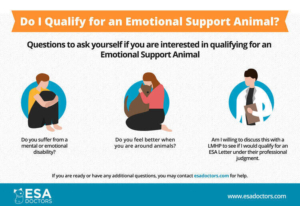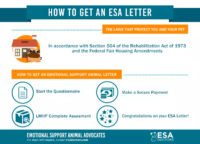
If you’re a resident of the Beaver State and you own an emotional support animal (ESA), you are protected by law from discrimination. If you are a fully qualified ESA owner in Oregon, your landlord or housing provider must accommodate your emotional support animal even if the building bans pets or you signed a lease with a no-pets clause.
As an ESA owner in Oregon, you do not have to pay any pet fees or deposits, and your animal is also exempt from breed, weight, and size restrictions that apply to normal pets. If you want to qualify for an emotional support animal in Oregon, this article will explain the only method that works under federal Fair Housing rules.

An emotional service animal (ESA) is recommended by a licensed healthcare professional to provide support and comfort to someone suffering from a mental health condition. An emotional support animal can be any small, domesticated pet typically kept in the home like a dog, cat, rabbit, bird, turtle, fish, small lizard, or gerbil.
An emotional support animal is not the same as a service animal. Service animals are individually trained to perform a task relating to a person’s disability. In contrast, emotional support animals do not need any specialized training. They provide comfort to owners just by being in their presence during difficult times. Service animals must also be dogs, but ESAs encompass a wide variety of animals.
Landlords must provide “reasonable accommodation” to tenants with emotional support animals. That means they must allow for emotional support animals even if they have a policy that bans pets.
However, as a landlord in Oregon, you don’t just have to rely on the tenant’s word that they own an emotional support animal. Landlords are entitled to see an ESA letter from the tenant. An ESA letter is how an owner of an emotional support animal proves that their animal is not just a pet but is an ESA that provides invaluable support for their mental health.
An ESA letter must come from a licensed healthcare professional. To obtain an ESA letter in Oregon, a patient or client needs to have been assessed with a mental or emotional health disability, for example:
If the licensed healthcare professional believes that an emotional support animal can help this mental or emotional health condition, they can write an ESA letter. An ESA letter should be on the professional’s letterhead and contain their license number, contact information, and signature.
 How to qualify for an emotional support animal infographic." width="750" height="516" />
How to qualify for an emotional support animal infographic." width="750" height="516" />

ESA letters are written by licensed mental health professionals, such as:
An ESA letter can be obtained online or in person. However, if you are an Oregon resident, the letter should be written and signed by a healthcare professional licensed to practice in Oregon.


A legitimate ESA letter in Oregon must be written and signed by a healthcare professional licensed to practice in the state of Oregon.
ESA Doctors, est. 2015
Unlike service dogs, emotional support animals do not have general public access rights. They are only protected in housing. That means you can’t automatically bring an emotional support animal into a public venue like a store or restaurant in Oregon. However, many businesses in Oregon are animal-friendly and will allow emotional support animals and pets as a courtesy.
In years past, emotional support animals were also allowed on flights. Unfortunately, that ended in 2021 due to regulatory changes. Psychiatric service dogs, however, are still allowed to board the cabin without any additional fees. Unlike an emotional support animal, a psychiatric service dog must be trained to perform a task or job related to the owner’s mental health disability. A licensed healthcare professional can help determine whether you meet the criteria for a service dog eligible disability. If you qualify, they can give you a signed PSD letter.


Rescued animals make great emotional support animals. If you’re looking to adopt an ESA in the Portland area, here are some shelters to check out:

The Oregon Humane Society, located in Portland, is an animal shelter that has adoption services for both dogs and cats. The shelter provides plenty of programs, such as student education classes, pet spay and neuter services, and assistance in finding a suitable pet for your individual needs and household.

The Oregon Dog Rescue shelter provides adoption services to Portland and the surrounding cities. This non-profit, no-kill shelter was founded by two local women in 2007. They focus on dog adoptions and have a monthly intake of roughly 175 dogs. In 2019 over 1,800 dogs were adopted.

Located in Aloha, Puplandia Dog Rescue is just a short drive west of Portland. Founded in 2016, this shelter is relatively young but has a great passion and large following. The organization is run by volunteers, and their mission includes six R’s—rescue, reach, rehab, reduce, relieve, respect.
Like any other pet, emotional support animals require regular exercise. Many owners will take their ESAs on walks around the neighborhood or daily run down the street. Dogs that enjoy the presence of other dogs will benefit from visiting a dog park, as these locations help exercise dogs both physically and mentally. If you own an emotional support dog and live in the Portland area, here are some dog parks to check out with your canine companion:

This natural forest garden features a wide variety of native plants, trails, different activity areas, and a hill shaped like a bowl. For your emotional support dog, there’s an off-leash dog area with plenty of room to run, and maybe even a squirrel to chase.

Wilshire Park is a 14-acre park. It doubles as a small wildlife sanctuary in the city, allowing visitors to unwind and enjoy nature. The large off-leash dog area is among the big trees, offering your emotional support dog natural protection from the elements.

Formerly know as Beech Park, Luuwit View Park is named after a Native American word. It is a large, open area allowing for all sorts of activities. The large dog area is fenced-in and contains paths for your emotional support dog and yourself.



About the Author:
The ESA Doctors writing team has extensive experience relating to disability and housing laws, mental health, animal training, and pet health. Each article is fact checked and reviewed by multiple members of our team. Many of the writers have emotional support animals and speak from real life experiences.
Get pet tips (like this post) + exclusive discounts every month!
We promise to never spam you.